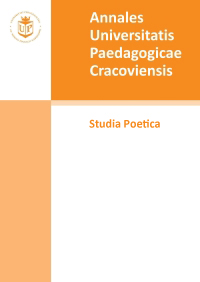„Teatralność” – zakazany język w teatrze doby performatywnej
“Theatricality” – a Language Forbidden in the Performative Era Theatre
Author(s): Ewa ŁubieniewskaSubject(s): Theory of Literature
Published by: Wydawnictwo Uniwersytetu Komisji Edukacji Narodowej w Krakowie
Keywords: performance;illusion;creation;computer actor;metaphor;reality;
Summary/Abstract: The notion of “theatricality”, transferred by Goffmann from the sphere of aesthetic disputeto the area of sociological considerations, has become the quintessence of “pretence”,“falsehood”, and immersion in “illusion”. As its opposite, the performative idea of theatricaltheory and practice proposes “truth”, “agency”, and immersion in “reality”, although it doesnot reject all of the theatrical effects. While inscribing those effects into a performanceenriches its appeal, applying performative actions that deconstruct the show turns againstthe nature of the theatre. The performances: Na niby – naprawdę, directed by Andrzej Dziuk,Być jak Steve Jobs, directed by Marcin Liber, and Akropolis, a project by Łukasz Twarkowski,presented and analysed in this paper, show various ways in which theatre – urged to chasemodern reality – deals with the radical change in the cultural situation.Dziuk’s staging is a confrontation between the poetics of the stage metaphor (‘pretence’) andthe performative theatrical devices (‘reality’), yet their values are reversed. The act of dramaticcreation of the main character, actor Ginesius, proves spirituality to be the “real” dimensionof the world, while the actual “reality” turns out to be a “faked” life. In Liber’s show, theprecious “relic” of the “old” theatre is the character whose Brechtian songs comment on theworld’s convulsions after the 1989 transformation. In his vision, the dominant elements arethe digital effects, the audience is entertained by the revolving stage, and the actors createcharacters taken straight from the tabloid reality. At the end, one of the beneficiaries of thepolitical changes provocatively announces taking over the theatre building, closing the theatreand laying off the actors: theatre has become redundant; we can only watch the methodicaldeconstruction of what used to define its significance. In turn, in Twarkowski’s show most ofthe action takes place on a screen hung above the stage, which features the actors’ partner –a computer equipped with a speech synthesizer. The director admits that he dreams of“a computer actor”. In the future, implementing this idea may replace the live relationshipbetween the actor and the spectator. The only element of the show that offers a direct actorspectatorcontact is the performative “interlude”, in which an actress presents to the audiencethe sensations of a person who has suffered a stroke.Are we, then, witnessing the times when the performance overwhelms theatre altogether,and the audience, driven by new desires, bids farewell to the loathed “theatricality” withno regrets? Perhaps, instead of yielding to this expansion, we should revise the label of“theatricality”, which reduces the rich tradition of diverse artistic conventions to one dramaticmodel of naturalistic origin. Perhaps, the term “theatricality” should be redefined in thespirit of Artaud, Witkacy, and Brecht, for whom “theatricality” is the opposite of “pretence”,a manifestation of the artistic creation process. Thus understood, “theatricality” has thepotential – through metaphor, poetic image, and other acts stimulating the imagination – totransform “the fake” into “the real”, and to transfer the spectator into a “reality” of higherorder: the reality of art.
Journal: Annales Universitatis Paedagogicae Cracoviensis. Studia Poetica
- Issue Year: 7/2019
- Issue No: 1
- Page Range: 222-233
- Page Count: 12
- Language: Polish

